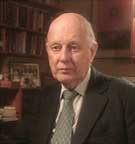Dr. Frederick Seitz , who died yesterday at the age of 96, was a great scientist, a President-Emeritus at Rockefeller University and a past president of the U.S. National Academy of Science.
Which makes it a greater scandal that people like Dr. S. Fred Singer took such advantage of the man in his declining years.
It must be said that Seitz originally invited the abuse. In the 1970s and ’80s, he accepted $585,000 (which, if it need be said, was a lot of money) from the tobacco giant R.J. Reynolds and he helped the smoke promoters spend $45 million (which is still a lot of money) on research that pointed didn’t prove any adverse health effects from smoking.
In the ’90s, he switched his allegiance to a new corporate funder and started denying the science that explains global warming. Perhaps he enjoyed hanging around with the self-styled “skeptics” who buy lavish lunches at the country’s wealthiest think tanks. And perhaps the other people in that circle just realized that they could profit by their association with a man who had once had a stellar reputation in the science community.
Certainly, he seems to have lost his edge. Because in 1989, in this internal memo, Alexander Holtzman at Philip Morris suggested that his company find another cooperative science expert because the word was out that “Dr. Seitz is quite elderly and not sufficiently rational to offer advice.”
That was August 31, 1989 – the tobacco industry dismissed Seitz as “not sufficiently rational” 18-and-a-half years ago – and yet Fred Singer was passing around a new report earlier yesterday, crediting Seitz in the foreword.
Seitz may or may not be facing his own judgment even now – the answer to that question is even more complex than whether climate change can be proven to the Heartland Institute’s satisfaction. But Singer is still around to be judged on Earth. And “innocent” just doesn’t seem to be one of the available verdicts.
Subscribe to our newsletter
Stay up to date with DeSmog news and alerts






